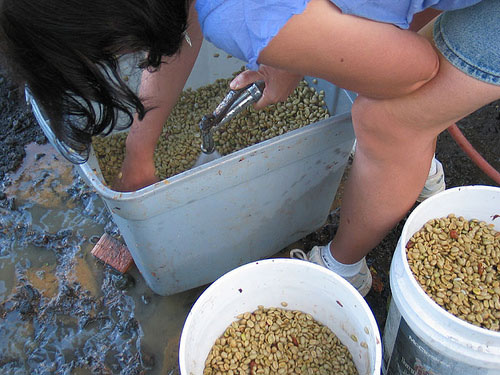 Today, we're addressing "fair trade" coffee. Believe it or not, there's a workaround in how you buy your coffee that keeps it truly "fair."
Today, we're addressing "fair trade" coffee. Believe it or not, there's a workaround in how you buy your coffee that keeps it truly "fair."
The common misconception is that "fair trade certified" coffee is the best bean to go with from a social perspective. People trash Starbucks for poor Fair Trade support – but buy your coffee just about anywhere that has a billboard and you’ll be a part of similar corporate shenanigans.
First, here’s a little introduction. Before coffee gets into your cup, it’s grown, picked, processed, shipped, roasted and ground, in that order. Usually, a corporation stands in front of everything and just gives you the roasted, pre-ground (or even flavored) beans. And since they’re standing there, blocking the rest of the process, there’s no transparency. You get bags of beans that don’t denote roast levels or region specifics. You need something like “fair trade certification,” or you’d never know what’s going on. The certification guarantees that farmers (way back in the very first step of the process) were paid at least a “fair” price for the coffee – enough to live on. There's essentially a minimum amount of money that the farmers are guaranteed to have been paid.
But, this is coffee made for the dough. Think about the economics. What happens when you put a price-floor on a commodity? The result is the same reason we refute communism and socialism here in America. Quality goes down. The market gets flooded with supply as farmers (even shoddy ones) gobble up the nice "fair trade" prices. It pushes the price down for those who aren’t involved in the program. Next thing you know there’s coffee farms in Canada selling over-priced garbage to Frenchmen. If that's the system you'd like to invest in, keep going to the grocery store for your coffee.
Here's the workaround: Coffee can be fairly traded without being “fair trade.” That’s what you’ll be getting if you go to a premium place for your coffee or order the green beans and roast it yourself. Boutique roasters have a totally different process than the corporate coffee producers. Small shops roast and grind right there in the store. The owners – and even some of the baristas – have met the farmers that grow their beans. The storeowners and importers make frequent trips to tropics. In a relationship like this, the importers and the farmers will sit down and try the coffee together since they’re both vying to make the best cup together. They’re invested in those third-world communities, and in return, the families and communities strive for the best coffee. It’s a symbiotic relationship.
Coffee is a serious business in developing countries. These farmers take pride in their crop. It’s land, crop and technique passed down for generations. If their coffee isn’t quite up to par, then they don’t want the charity of fair trade organizations. They want to fix it. And any legitimate coffee-buying entity is willing to invest in a bunch of bicycles for transporting beans quicker, or a different processing method – as long as it means better taste in the cup, a mutual goal. When you buy coffee from a local roaster or importer, you’re getting two things: quality and fairness. They go hand in hand. No certification required.
What are your thoughts on fair trade coffee? Leave a comment.
[image via FarmerGary]
